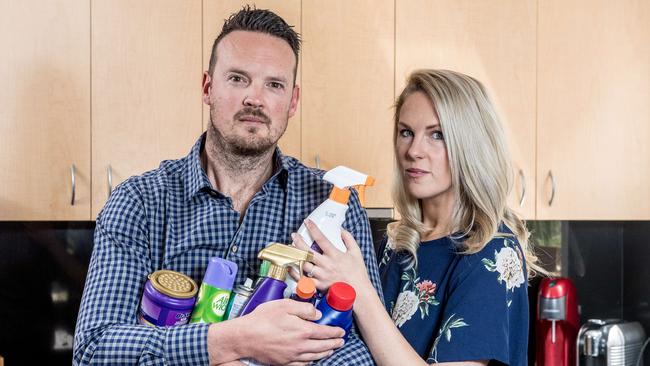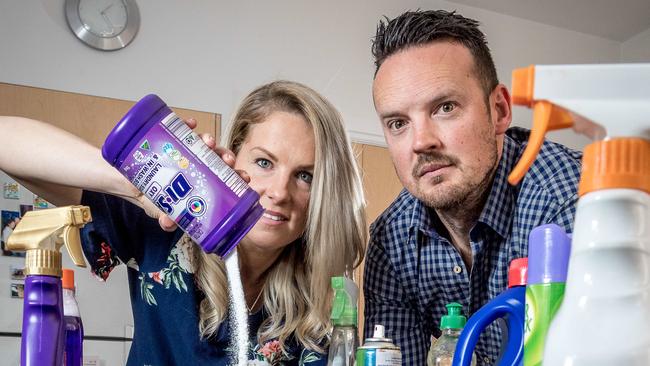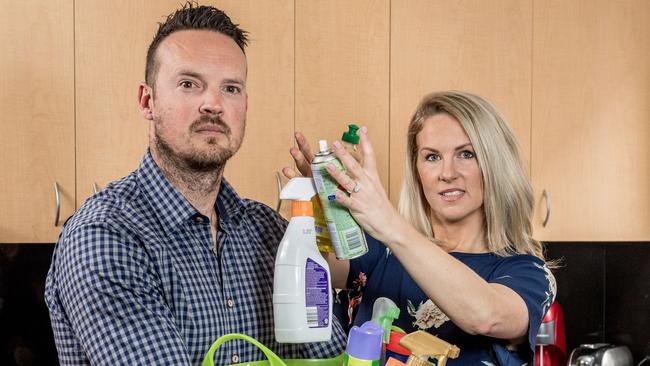Research links infertility in men and women to common, everyday household chemicals
RESEARCHERS have issued a warning over a litany of household items containing chemicals that can reduce fertility, as a new list is launched to help prospective parents minimise risk.

News
Don't miss out on the headlines from News . Followed categories will be added to My News.
- New study finds IVF perserverance
- The calculator to assess baby chances
- 38-year gap couple trying for baby
- Why men risk missing out on fatherhood
Common chemicals in foods, cosmetics, cleaning products and plastic containers are potentially reducing fertility, research has found.
The government-funded Your Fertility program and the Fertility Society of Australia have released a list of ways people can reduce exposure to everyday chemicals to minimise risk.
Dr Mark Green, a Melbourne University senior lecturer in reproductive biology, has reviewed how common chemicals known as “endocrine disrupting chemicals” (EDCs) can impact fertility in women and men.
“You can get these chemical exposures from multiple sources, in anything from food stuffs to the way you are heating those in a microwave (in or covered by soft plastic) or ovens — considering containers and receptacles is important, almost as much as considering what you are eating,” says Dr Green.
Three main chemical categories to be avoided are parabens, which are common preservatives in personal care items, phthalates, which make plastic flexible, and BPAs, another plastic ingredient used in the linings of food cans.
“Household sprays and chemicals for cleaning the bathroom, shampoo and conditioner all have parabens, and people may not know much of the absorption of chemicals can come not from eating or drinking but also from exposure through the skin of these or from cosmetics,” he said.

Very commonly-handled items, such as printed cashier’s receipts, often have a thermal coating “absolutely covered in” BPAs and plastic water bottles allowed to heat in cars before cooling again and being drunk can expose people to “leached” BPAs.
“Little and often exposure (to such chemicals) can actually end up being quite considerable when it is all compounded.”
Persistent organic pollutants including herbicides and pesticides were also potentially increasing people’s levels of endocrine disrupters, he said.
Dr Green’s work will be presented to Monday’s Fertility Society of Australia conference.
He said people should not panic but has prepared a list of ways people can reduce exposure including:
* Eating fewer processed, canned and pre-packaged foods.
* Avoiding handling printed sales receipts.
* Drinking out of glass or hard plastic bottles rather than soft plastic bottles and never re-using soft plastic bottles.
* Never heating food in plastic takeaway containers or putting cling film or foil over food being heated in ovens (cover it with a paper towel or china plate).

Counsellor Emily Hunter and her husband Michael Sier are planning to start a family and, having read Dr Green’s guidelines during their preparation, have made changes to their lifestyle.
“It was a wake-up call,” said Emily Hunter.
“I was definitely surprised by some of the findings and didn’t realise how many of those things I was actually using. You can easily make some changes that aren’t too difficult.”
The couple has started choosing products without parabens for skin and hair, and stopped using cling film when heating food.
“I assumed using cling film in the microwave was safe, that’s something that really surprised me. Now I’m strict about not re-using water bottles as well.
“I am still using spray for cleaning products but I’m using a lot ventilation now, before I wouldn’t have cared as much.”
Other recommendations to protect fertility include washing all fruit and vegetables and avoiding using garden herbicides and pesticides.
To see the full information sheets on how to reduce chemical exposure visit the Your Fertility website.


